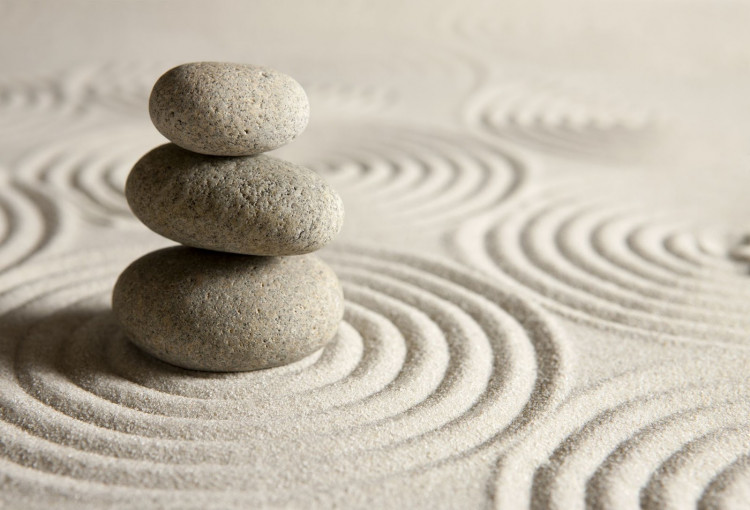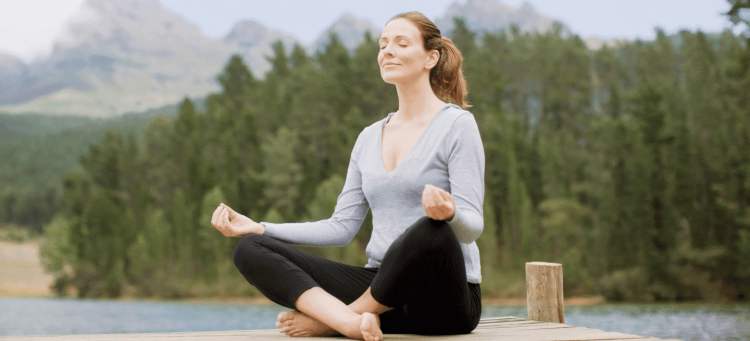

75 to 85% of women experience the symptoms of menopause.
And guess what?
Studies show that meditation effectively controls menopausal symptoms by manipulating your mind.
Ayurveda and yoga recognised centuries back that your mental health has a significant role in keeping your physical body healthy.
And, Smriti meditation is a very special ayurvedic psychotherapy technique that can do wonders.
Want to know how meditation can ease your menopausal symptoms?
Keep scrolling!
Meditation - Mind-Body Training!
Meditation is a way of exploring and improving your inner self according to the traditional Indian disciplines of yoga and ayurveda.
It involves techniques to train the mind and body and is known by scientists as "mind-body training."
Through meditation, you can improve emotional stability, increase consciousness, develop a connection to your inner thoughts, and reduce stress.
Effects of meditation on body?
Meditation has been shown to enhance the production of alpha waves in the brain that are linked with relaxation.
It also impacts the regions of the nervous system responsible for regulating the endocrine system (which balances hormones).
Furthermore, studies have demonstrated that meditation can alleviate various symptoms of menopause such as mood swings, depression, anxiety, body pain, insomnia, and hot flashes.
Menopause, Mental Health, and Meditation

Menopause is a natural biological process that marks the end of a woman's reproductive life, typically around the age of 45, caused by a decline in estrogen levels.
It brings along physical symptoms such as hot flashes, weight gain, and slowed metabolism, but also has an impact on mental health.
Menopause can cause anxiety, depression, sleep disturbances, decreased concentration, and reduced self-esteem, along with mood changes and life stressors.
The Benefits of Meditation for Menopause
Meditation, a simple mind-body practice, can effectively reduce menopausal symptoms, provide relaxation and avoid the side effects of other traditional treatments.
This practice is easy to do, requiring minimal physical exertion, and can help women manage and accept the changes of menopause.
Explore further for more information on how to start your meditation journey.
Exploring your Mind Castle!
Ready to take a journey within and explore your inner self?
Here's how to get started:
Timing is Everything:
Choose the time of day when you know you won't be disturbed, such as sunrise or sunset.
If you're looking for better sleep, try yoga nidra meditation before bed.
Find Your Oasis:
A quiet and peaceful space is ideal, but if that's hard to come by, a place with good air circulation, light, and minimal distractions will do.
Comfort is Key:
Relax and sit comfortably, with an upright spine, relaxed neck and shoulders, and closed eyes.
It's best to meditate with a semi-empty stomach.
Warm Up Your Mind:
Warm-up exercises for your mind? Yes! They help improve circulation and make you feel lighter.
Fill Your Lungs with Prana:
Pranayama or breathing exercises help steady your breath and bring you into a meditative state.
Time to Meditate:
There are many different meditation techniques, each requiring concentration, awareness of your body and mind, focus, and more. You can start with a group meditation, like smriti or guided meditation. Keep reading to learn more about smriti meditation.
Return to Reality:
As you end your meditation session, open your eyes and move your body slowly.
Take your time to become aware of your being and surroundings.
Start with 10-20 minutes for your first time.
Now it's time to delve into the world of Smriti meditation!
Smriti Meditation

Meditation, the art of regaining control over our senses, can profoundly impact our health.
Smriti meditation is a unique form of ayurvedic psychotherapy that targets the root cause of psychosomatic symptoms and heals the emotional aspect of illness.
According to Dr. Dilip Kumar, founder and expert in ‘Smriti meditation’,
"Smriti meditation delves deep into our emotional well-being to identify the source of discomfort and uses meditation as a tool to heal."
Menopausal symptoms such as sleep disturbances, hot flashes, gastrointestinal issues, anxiety, depression, and headaches often result from emotional factors. Smriti meditation provides a path to uncover and resolve these underlying emotional causes, promoting holistic healing and preventing future recurrence of symptoms.
Smriti Meditation: 5 Key Points to Know
No prior experience required!
To practice Smriti Meditation, you don't need to be a seasoned yogi or meditation pro. This form of meditation is accessible to everyone, regardless of prior knowledge or experience.
Expert guidance is a must!
To fully reap the benefits of Smriti Meditation, it is essential to receive guidance from an expert. This will ensure that you practice the technique correctly and make the most of each session.
A powerful tool for managing health conditions.
Smriti Meditation can be an effective tool for managing multiple health conditions, such as diabetes and hypertension. It is also helpful in identifying and managing psychosomatic symptoms related to stress, anxiety, and emotional trauma.
A unique approach to Ayurvedic psychotherapy.
Smriti Meditation is a unique form of Ayurvedic psychotherapy that uses memory to identify the root cause of emotional issues. Through meditation, this approach helps eliminate negative emotions related to these issues and encourages a more positive outlook on life.
Promoting peace and resolving conflicts.
In addition to improving physical and emotional health, Smriti Meditation can also help resolve conflicts with loved ones. A study has shown that conflicts with a spouse are often a primary cause of many health issues. By resolving these conflicts and cultivating a peaceful state of mind, Smriti Meditation can help prevent the recurrence of these problems in the future.

Steps to Smriti Meditation: A Guide
- Create a peaceful atmosphere
- Set your session goals
- Interactively discuss your goal
- Identify the root cause
- Eliminate negative emotions related to the root cause
- Find solutions and insights for managing the problem
- Return to a state of peace and develop a positive outlook on life.
Various meditation techniques
Meditation is not limited to just yoga or mindfulness.
There are other forms of meditation, like Tai Chi, Qigong, and Zen Meditation, that you can explore to find the one that suits you best.
Tai-chi meditation
Tai Chi is a widely accepted form of Chinese martial arts and a form of meditation.
It's an exercise that involves gentle movements, deep breathing, and mindfulness.
Tai Chi aims to balance the body and mind and is known to improve balance, flexibility, and overall well-being.
Qigong
Qigong is another form of Chinese meditation that involves deep breathing, movement, and mindfulness. It's a combination of physical postures, breathing techniques, and visualisation.
Qigong is known to be effective for stress relief, pain management, and improving immunity.
Zen meditation
Zen Meditation is a form of Japanese Buddhism based on mindfulness, concentration, and self-awareness.
It involves sitting in a particular posture and focusing on the present moment.
Zen Meditation aims to achieve inner peace and enlightenment and is known to reduce stress, anxiety, and depression.

FAQs
- Which meditation technique is the best for you?
Meditation is a personal journey, and what works for one person may not work for another. Find the form of meditation that resonates with you, and stick with it to reap its benefits.
Expert guidance can help one achieve their goal of positive health and assist in resolving existing health issues.
- Can it be done as a beginner?
Meditation is accessible to all and requires consistent effort to realise its benefits, especially for beginners. Regardless of the reason for incorporating meditation into one's life, such as reducing stress, improving sleep or addressing physical or mental issues, each meditation session brings one closer to achieving better health.
- What are the Don’ts of meditation?
Avoid:
- Judging yourself,
- Being discouraged by distractions,
- Comparing yourself to others,
- Being too hard on yourself, and
- Giving up.
- Does Meditation take a lot of time?
Meditation only requires a short time of sitting to be effective. It is about connecting with your inner self, which can occur quickly. The benefits of meditation come from consistent, regular practice, not from the length of time spent.
- Is Meditation related to any religion?
Meditation is not limited to a specific religious tradition and has roots in history. Its purpose is to promote unity and peace across all faiths, cultures, and backgrounds, allowing individuals to find inner peace regardless of their religious beliefs and without discrimination.
- Is Meditation difficult?
Many people believe that meditation is complex and not for everyone, but in reality, everyone practices meditation in some form daily. Any activity that requires focus and improves with practice, such as practising mindfulness or deep breathing, can be considered a form of meditation.
- Is meditation similar to hypnotism?
Meditation and hypnotism are contrasting practices. Hypnotism involves a person being unconscious of their actions or words, while full consciousness is required in meditation. Hypnotism focuses on a person's thoughts, while meditation frees them from their thoughts.
- Does meditation require lots of concentration?
Usually, there is a belief that meditation means concentration. Concentration is the benefit that we gain from practising meditation.
In brief,
Each year, over 6 million women worldwide experience menopause, but only 27% of them seek treatment for its symptoms.
Meditation offers a safe and effective solution with numerous physical, social, and psychological benefits.
It's accessible to all, and the cost-effectiveness and lack of side effects make it a popular choice.
If you want to start meditating, especially smriti meditation, don't wait any longer!













